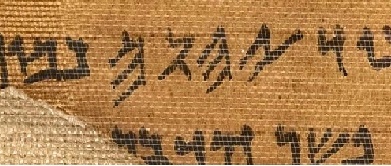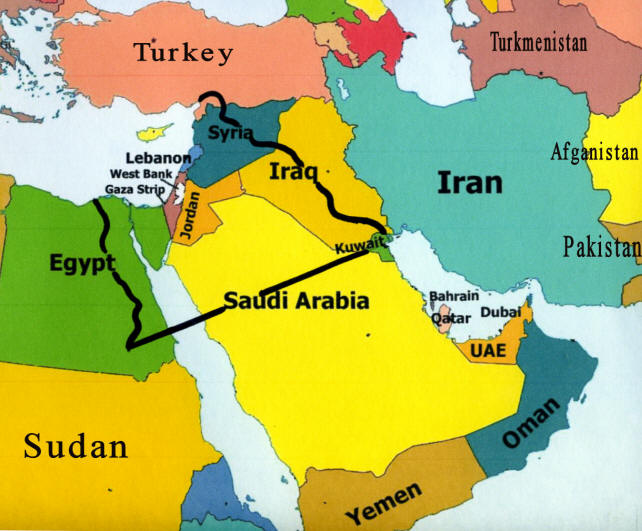Parsha Lech Lecha
Beresheeth (Genesis) 12:1-17:21
And YaHuWaH said to Abram, “Go yourself out of your land, from your relatives and from your father’s house, to a land which I show you. – Beresheeth (Genesis) 12:1
Abram lived during the second millenia from the creation of Adam. At age seventy five he set out from the land of Haran, being instructed by Yahuwah “Lech lecha” meaning get yourself out. YaHuWaH commanded that Abram leave his kindred and move out from the house of his father and to go to a land that he would be shown. YaHuWaH promised Abram saying “And I shall make you a great nation, and barak (bless) you and make your name great, and you shall be a berikoth (blessing)! “And I shall barak (bless) those who barak (bless) you, and curse him who curses you. And in you all the clans of the earth shall be baruch (blessed).” The term barak literally means to bend the knee, as in giving a gift or bestowing favor. Abram set out with his wife Sarai and his nephew Lot along with ha’nephesh aso, or the “souls they acquired” this literally refers to their servants but by mentioning the word nephesh meaning soul we know these sojourners were converts to the worship of YaHuWaH.
In Shechem as far as the terebinth tree of Moreh, YaHuWaH appeared to Abram and promised to give this land to him and to his seed after him. Therefore Abram built an alter to YaHuWaH there and made great sacrifices. Moving from there he pitched his tent with Beth El to the east and Ai to the west. In this place he built yet another alter and the text tells us “he called in the Name of YaHuWaH!” Abram knew YaHuWaH intimately by his true Name and vocalized his name publicly despite modern tradition of covering the Name with titles.

YHWH in Paleo Hebrew
After a very short stay in the Qodesh (Set Apart) Land of Promise, Abram and Sarai are forced by famine to “descend” to Mitsrayim known as Egypt today. Truly Torah calls all journeys to the Promised Land as “ascent,” likewise all departures from it are “descents.” This descent into Mitsrayim brings about a great trial for both Abram and Sarai. Abram knowing the wickedness of the culture in Mitsrayim spoke to his wife making her promise to claim only to be his sister and not his wife so that when the Mitsarites looked upon her beauty they would not slay Abram to take her. Abram’s concern is proven true immediately. Sarai’s beauty is so great at this time of her life when she was in her sixties that she was found fit for Pharaoh, and is taken to the Pharaoh’s palace. Abram, who is though to be her brother, is given extravagant gifts such as “sheep, cattle, donkeys, slaves, maids, she-donkeys and camels.” YaHuWaH sends a plague upon the palace and reveals to Pharaoh that Sarai is Abram’s wife. YaHuWaH forces Pharaoh to release Sarai untouched and further compensate Abram for taking his wife. Abram returns to the Promised Land far more prosperous than he already was, “laden with cattle, gold and silver.”
After Abram returned to the land of Kena’an or as the Torah says he ascended, Lot separated due to conflicts in the campand chose to settle in the sinister city of Sodom.
Beresheeth (Genesis) 13:14 And after Lot had separated from him, YaHuWaH said to Abram, “Now lift up your eyes and look from the place where you are, northward and southward and east- ward and westward, 15for all the land which you see I shall give to you and your seed forever. 16 “And I shall make your seed as the dust of the earth, so that, if a man could count the dust of the earth, then your seed also could be counted. 17“Arise, walk in the land through its length and its width, for I give it to you.”
Therefore Abram built yet another alter to YaHuWaH after pitching his tent by the Terebinth Trees of Mamre.
At this time a great rebellion came about with the cities of the plain in Sodom against their former conquerors. Chedorlaomer the king of Eilam along with three allied kings prepared their armies and marched to the Sodom Valley to end the rebellion. On the way, they fought numerous battles, defeating the Rephaim, the Zuzim, the Emim, the Hori, the Amaleikites and the Emorites. As a resident of Sodom, Lot was captured during the war against Chedorlaomer and his allies. The text states that a fugitive went and informed Abram Ha’Ibri or “The Hebrew”, Ibri, Ivri, Eberi and such forms come from the word Eber the ancestor of Abram but also refer to those who speak the Ibri (Abrit) language. The word also means “one who crosses over” which referred to Abram who crossed the Euphrates leaving behind Ur of the Chaldees. When Abram heard of the news he rallied three hundred trained servants of his household and chased down the four sovereigns, by night they smote them, recovering Lot and all the spoils that were won in the wars. Abram is then met by Malki Tsedek who is the Sovereign of Yaru and Salem which would later be called Yarushalayim. Malki Tsedek was not only the sovereign of Salem but also the Kohen (Priest) of YaHuWaH El Elyon, the Most High.
Beresheeth (Genesis)14: 18And Malkitsedeq sovereign of Shalem brought out bread and wine. Now he was the priest of the Most High El. 19 And he blessed him and said,
“Blessed be Abram of the Most High El, Possessor of the heavens and earth. 20 “And blessed be the Most High El who has delivered your enemies into your hand.” And he gave him a tenth of all.
Sovereign Dawid (David) many years later would write in the Tehillim 110 concerning the Mashyach (Anointed One) who was to come saying “you are a kohen forever after the order of Malki Tsedek.” Abram gave the maaser, tithing a tenth of all his possessions to this Malki Tsedek, thereby distinguishing the greatness of the Malki Tsedek order. Yahuwshuwa (Yahushua) is the promised kohen (priest) and melech (sovereign) after the ancient order of Malki Tsedek. The presenting of the bread and wine to Abram at this time is a covenant meal, Yahuwshuwa confirmed the covenant later in the same manner.
At this time the thankful king of Sodom told Abram to keep all the spoils as his personal reward. However Abram responded: “I have lifted my hand to YaHuWaH, the Most High El, the Possessor of the heavens and earth, not to take a thread or a sandal strap or whatever is yours, lest you should say, ‘I have made Abram rich,’ except only what the young men have eaten, and the portion of the men who went with me”
After these events the word of YaHuWaH came to Abram through a vision saying “Do not be afraid, Abram. I am your shield and your reward is exceedingly great!” At which time Abram brought up the fact that he had no heir except for his relative Eli’ezer of Damascus. YaHuWaH assured Abram that he would have a son! Further telling him to count the stars if possible and that his seed will be as numerable.
Abram believed in YaHuWaH therefore being counted for tsadikah or righteousness. YaHuWaH confirmed the promise to Abram via “brit bein ha’bitirim” or the Covenant Between the Parts. Abram sacrificed three heifers, three female goats and three rams along with a turtledove and a young pigeon. He split the animals into halves except for the birds and placed each half opposite the other. Birds of prey came down but Abram dove them away. When the sun was going down, he slept and a frightening great darkness came upon him. And YaHuWaH said to Abram, “Know for certain that your seed are to be sojourners in a land that is not theirs, and shall serve them, and they shall afflict them four hundred years. But the nation whom they serve I am going to judge, and afterward let them come out with great possessions.” When the sun went down and it was dark, a smoking oven and a burning torch passed between the pieces. Thereby showing the manifested Debar (Word) ofYaHuWaH had confirmed the agreement with Abram, the smoking furnace also symbolizing the destruction of all the nations who come against Abram’s descendants. YaHuWaH promised Abram all the land from the river of Mitsrayim (Egypt) to the river Euphrates.
After ten years have passed, Abram and Sarai remained without child in their old age. Sarai in an act of desperation presented her Mitsarite servant girl Hagar to Abram urging that he should raise a son through her. Abram heeded the voice of his wife but soon after Hagar began to despise Sarai and when Sarai put her in line she fled. The Malak (Messenger) YaHuWaH appeared to Hagar instructing her to return to Sarai her mistress. The Malak YaHuWaH further revealed that Hagar was pregnant with a son who would be named Yishmael and from him would come a great nation. Hagar was obedient and returned, giving birth to Yishmael when Abram was eighty six years old.
After thirteen additional years Abram has grown to age ninety nine and YaHuWaH appeared to him yet again to confirm the brit (covenant). YaHuWaH renamed Abram, whose name means “exalted father” to Abraham meaning “father of multitudes.” YaHuWaH also changed Sarai’s name from “my princess” to Sarah meaning queen because she is to bare a son and sovereigns will come form her. When Abraham heard this message that he who is one hundred and his wife who is ninety will have a son, he laughed. Therefore Abraham’s son would be named Yitshaq meaning “he laughed.”
Beresheeth (Genesis) 17:19 And Elohim said, “No, Sarah your wife is truly bearing a son to you, and you shall call his name Yitshaq. And I shall establish My covenant with him for an everlasting covenant, and with his seed after him. 20“And as for Yishma’el, I have heard you. See, I shall bless him, and shall make him bear fruit, and greatly increase him. He is to bring forth twelve princes, and I shall make him a great nation. 21“But My covenant I establish with Yitshaq, whom Sarah is to bear to you at this set time next year.”
YaHuWaH gave Abraham the covenant (brit) of circumcision (milah) when he was ninety nine years old and on that very day he was circumcised in his foreskin along with all males amongst him, including of course Yishmael and all the strangers and sojourners.
Abraham is a role model of belief and his life should be studied in great detail. He is a forerunner of the Anointed Sovereign, HaMashyach Yahuwshuwa. Abraham was willing to leave Ur of the Chaldees, ancient Babylon, to depart from his father’s house in pursuit of YaHuWaH’s will. When faced with challenges he did not back down but rested in the fact that YaHuWaH was his shield. He was able to defeat great armies with the belief he had in his Elohim. With his belief and endurance he was reckoned as tsadik or righteous. We too must have endurance and belief to please YaHuWaH.





